“Lee has maintained a fairly amicable relationship with his prison warders ever since his incarceration, often engaging in conversations with them on various topics, occasionally touching on the murder… He has exhibited a deeply religious nature… Each morning, upon rising before making his bed, he unfailingly kneels down and offers his prayers. Likewise, before retiring for the night, he performs the same religious rituals, often spending an extended period in prayer. He reads extensively, particularly his Bible… Lee rarely shows outward signs of being affected, but it was observed that when the warders mentioned Miss Keyse’s name, he appeared on the verge of tears and repeatedly requested that they refrain from mentioning her. At no point has he confessed to the murder, although he has expressed the belief that he deserved hanging for not revealing everything he knew about the incident. He maintains that the mystery will be solved within three years of his imprisonment… Lee believes that divine intervention saved him because of his innocence, stating, ‘God does not descend and say, ‘Don’t hang that man,’ but he acts indirectly. He sent the rain and caused the trap to malfunction.'” – Exeter Flying Post
On 23rd March 1885, Lee commenced his twenty-two-year sentence in prison, which he referred to as “the living Death.”
Prison Life:
Pentonville: March 23rd to June 10th, 1885
Wormwood Scrubs: June 11th to October 28th, 1885
Portsmouth Public Works: October 29th, 1885, to 1892
Portland: 1892 to December 1907
Lee was determined to survive for his eventual freedom. He found prison life exceptionally harsh but made sure to maintain an exemplary character in the eyes of the prison officials. While some convicts discussed the nature of their crimes, he made a personal rule never to engage in such conversations. He regularly petitioned the Home Office, asserting his innocence without divulging details of the murder or providing any hints about who he believed was responsible for Miss Keyse’s death. Lee often wrote about his harrowing experience on the gallows, describing how he was on the brink of eternity three times, hoping that this account would elicit a sympathetic response to his pleas. However, his efforts were in vain. The Home Office deemed the murder of Miss Keyse particularly heinous, resulting in Lee serving a twenty-two-year sentence. Lee had initially hoped for just fifteen years and later became convinced that he would not have to stay imprisoned for over twenty years, so by his twenty-second year, he had all but abandoned hope. The legend of “The Man They Couldn’t Hang” persisted throughout his incarceration, leading to numerous letters being sent to the Home Office inquiring about John Lee.
As previously mentioned, in August 1887, it was widely reported that Elizabeth Harris had confessed to her involvement in the Babbacombe Murder on her deathbed. However, the Home Secretary denied these claims.
Undoubtedly, Lee’s notoriety contributed to his prolonged imprisonment. The Home Office feared that once released, he would immediately take his story to the Music Halls, causing embarrassment to Whitehall and Westminster. One Music Hall manager even proposed featuring Lee on stage alongside James Berry to re-enact the failed hanging repeatedly. Eventually, the Home Office decided to release Lee, albeit with a special condition on his license prohibiting him from exploiting his own story.
Correspondence
Please read these notes: The following records appear courtesy of The National Archive. I cannot take responsibility for any error in the following as every effort has been made to ensure this is as true a transcription from the original handwritten court records as possible. These records describe a brutal murder. You might find the contents of this archive disturbing. Spelling and general language remain unchanged from the original documents. Brackets are placed around a phrase or word where difficulty is experienced in understanding the original text. These documents can be located at the National Archive, Kew, filed as follows: Home Office and Prison Commissioners: HO 144 / 1712 and PCOM 8/87
These pages are a selection of recorded events in John Lee’s life in custody – as prisoner L150.
Here you can taste the incredible change in Lee’s psychological state as the year’s passed by.
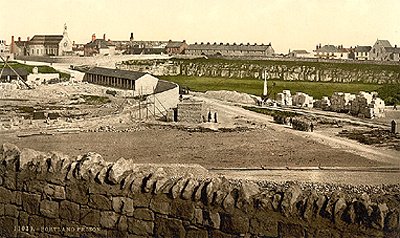
You can also get a feeling of his perpetual unchanging determination that he really was not the killer – or at least if not the murderer, someone who who knew something the rest of the world did not. What exactly this ‘secret’ information was, we will never really know!
There is also an insight into the closed, unmoving, unshakeable world that was the heart of the British Empire at it’s peek – a world that was Victorian and Edwardian Whitehall – the sound, solid British Government machine at work.
above: Postcard picture ‘Portland Prison’ – 1890
During Lee’s time in prison, the following were Home Secretary:
- 23 April 1880 SIR WILLIAM VERNON HARCOURT
- 24 June 1885 SIR RICHARD ASSHETON CROSS
- 6 February 1886 H C E CHILDERS
- 3 August 1886 HENRY MATTHEWS. Viscount Llandaff
- 18 August 1892 HERBERT ASQUITH. 1st Earl of Oxford and Asquith
- 29 June 1895 SIR MATHEW WHITE RIDLEY. 1st Viscount Ridley
- 12 November 1900 CHARLES THOMSON RITCHIE. 1st Lord Ritchie
- 11 August 1902 ARETAS AKERS-DOUGLAS. 1st Viscount Chilston
- 11 December 1905 – 1909 HERBERT JOHN GLADSTONE. 1st Viscount Gladstone
Following Lee’s remarkable dodge from the death penalty, the Home Secretary ordered that he be held at ‘Her Majesty’s pleasure’, with a proposal that be should never be released.
After leaving Exeter Prison in March 1885, Lee spent brief periods in solitary confinement at Pentonville and Wormwood Scrubs before being transferred to Portsmouth Prison on 28 October, 1885.
In 1892, he was moved to Portland Prison where he served the remainder of a sentence. John Lee later described his life at Portland as a ‘living death’.
Parliamentary Members took up John Lee’s case. Rumours of his looming release resulted in a crowd assembling at Weymouth Railway Station, hoping to catch sight of Lee arriving from Portland.
The Sunday Chronicle serialised Lee’s story and published letters written by the prisoner declaring his innocence and urging readers to petition the Secretary of State on his behalf.
Additional demands were put forth on the authorities by the prisoner himself who sought permission to improve his appearance before his discharge. He bad a poor set of false teeth fitted and was allowed to grow his hair.
Despite all the efforts and extreme caution on behalf of the Home Office, it wasn’t until the end of 1907 that The Man They Could Not Hang was finally released on licence from Portland into a world that had significantly changed since 1885.
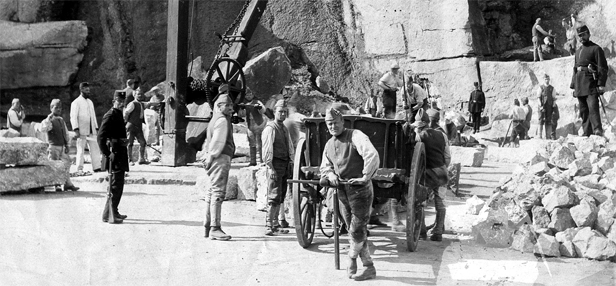
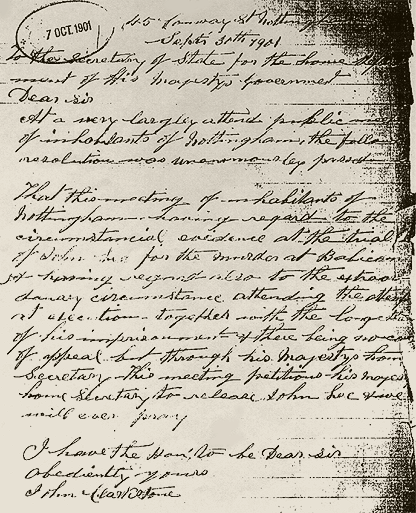
45 Conway Street, Nottingham,
Sept 30th 1901
To the Secretary of State for the Home Office of his Majesty’s Government.
Dear Sir,
At a very largely attended public meeting of inhabitants of Nottingham, the following resolution was unanimously passed.
That this meeting of inhabitants of Nottingham having regard to the circumstantial evidence at the trial of John Lee for the murder at Babbacombe and having regard also to the extraordinary circumstances attending the attempted execution together with the length of his imprisonment and there being no course of appeal but through his Majesty’s home secretary. This meeting petitions his Majesty’s Home Secretary to release John Lee and have will ever pray.
I have the honour to be dear Sir
obediently yours
John Clarkstone
17th August 1886
L150 John Lee, Portsmouth
Petition
Prays that his case may be looked into, and something done for in.
Grounds: That he is innocent, his trial was not a fair one, that all he told his solicitor was not brought forward for his defence, and that the letter had come to his solicitor from America stating that petition I was innocent
Portsmouth prison
19/8/86
Sir,
L150, J. Lee is at present in good health. There are no medical records for extra food at present.
I am etc.,
(signed) F. A. A. Smith MD Assistant Surgeon
Boston and Lincolnshire Advertiser, Boston
Ingamells & Beaulah
26 August 1887
To the Secretary, Prison Department, Home Office, Whitehall
Re. Convict Lee, the Babbacombe murderer
Dear Sir,
Rumours are current innocent neighbourhood to the effect that Lee has been liberated owing to another person having made of formal confession is exonerating Lee and implicating himself. The public mind is much exercised by these rumours and I shall be much obliged, if you will enable me to get a matter rest by an authorative detail.
Yours truly,
Thos. Beaulah
1st November 1887
Confined in Portsmouth prison.
When: 29 January 1885. Where: Devon Assizes Crime: murder
Sentence: to be hanged (commuted) for natural life.
Remarks: conduct – good to date.
Other convictions: Devon sessions 4th July 1883 – six calendar months.
HL stealing silver candlesticks and other articles.
Remarks:
Prays for the consideration of his case, grounds. That he has been three times in the agony of death the severity of the sentence for a crime of which he is innocent – these solicitor employed to look after his case was taken with a fit of insanity and his brother took the case in hand but had nothing ready for his counsel.
J. N.Walsham.
Chaplain.
Petition
Sir,
I petition to ask you if you can do anything for me. Sir, I think that it is very hard after all I have been through the agony of death and then the suspense for a month and then of the dreadful sentence of penal servitude for life for a crime and innocent of. And, Sir, I humbly beg you to take my case in the consideration I think that I had a good solicitor to look after my case and have got a proper defence then I should have got of honourable. Sir I wish to bring before your notice that the solicitor then my parents employed to look after my case was between the coroner’s inquest and the trial taken with a fit of insanity and all that I had told him about the case and all that he himself had prepared was of no use and just as the trial commenced his brother took the case in hand, but he had nothing for my counsel and he could do nothing for me and I humbly beg you, sir, to take my case in the consideration and see if there is anything that you can do for me. It is a very sad thing for a young man to be in.
I remain,
your most humble,
servant,
John Lee.
Circa November 1887
Prays that his case be considered and something may be done for him. Grounds: that he is innocent of the crime and after going through the agony of death he was sentenced to penal servitude for life and his solicitor was taken ill and went out of his mind, his case was not properly looked after and he is a young man.
JR Walsham
Chaplain
Sir,
I wish to bring my case before you Sir. And I should be very thankful if you please take into consideration. I think it very hard for me to suffer. I am innocent former crime that I did not do nor have anything to do with, Hon Sir. I think it very hard for me after going through the agony of death to the sentence of penal servitude for life and I beg you Sir to see if you can do something for me. I think that if witnesses had spoken the truth and nothing but the truth that I should have been set at liberty and also that my solicitor was taken ill and went out of his mind and that my cause was not properly looked after and after that Miss Keyse was my best friend. She was a mother to me, we fell out sometimes that it was all over in our after it was in one of these kinds of it almost dead sister that I should leave and she said “suppose that Miss Keyse will not give you a character” and I said “that I will set the old place on fire” that was three months before the murder and we never fell out after that she was my only friend and, Hon Sir, what would have been my object in committing such a crime on my best friend where I lost everything and nearly all my life to if the Lord had been merciful to me and save me from such a horrible death.
Right Hon Sir, I humbly beg you to do something for me. I am a young man of 24 years of age and to be sent for prison for life is something awful in itself without the other suffering which I have gone through worse than death itself. Hon Sir, I am innocent of the crime that laid to my charge.
Your humble
Servant
John Lee
23rd June 1889
Portsmouth
Petition
Notes:
Prays that his case may be considered and something may be done for him.
Grounds: that God save him from the sentence of death being carried out and he thinks that he might (right?) To have been set at liberty.
J.P. Walsham
Chaplain.
To the Secretary of State
Right Hon Sir,
I humbly ask you to take my case into consideration to see if you can do anything for me. I think I have been through enough. Right Hon Sir, I was by the judge sentenced to death by being hung by the neck till dead.
And I prayed unto God to deliver me and went on the 18th of February I was informed by the Governor of Exeter prison that there will be no reprieve for me then I give up all over the God did not forget me in the hour of the trial. His hand was their mightily to save me from death and I think that all people who believe in God can see plainly enough that no one but God could have save me were so many men trying to carry out the sentence. Right Hon Sir. I think that I ought to have been set at liberty instead of penal servitude for life.
I humbly beg you to take my case into your consideration.
John Lee.
3rd April 1901
Petition from Prisoner
Governor’s report.
Minutes.
1. Asks for release, on the ground of the agony caused in by the failure of attempts to hang him and the consequent suspense.
2. Asked to be allowed to have a photograph taken off himself twenty years ago.
Let (2) be allowed
ALW 10/4/1
To directors to deal with.
10/4
referred: 12 April 1901
Petition
Prays for his release.
Plea: was three weeks and a sentence of death.
That three attempts were made to hang him, but they all failed. Has been 16 years in prison.
Also prays that he may be permitted to keep a photograph of himself taken twenty years ago.
Chaplain.
Three times the drop the drop about two inches and left him upon his heels and toes.
And the same day and the following day I was taken out to exercise in the sight of the grave done to receive my body. And when the authorities failed to carry out the execution I was kept for four weeks under the terrible suspense of being put to death at any hour during that time before the Governor of Exeter prison came and told me that her Majesty the Queen had been please to commute my sentence to penal servitude for life.
And having done over 16 years with a character I ask you to kindly recommend me for release and your petition and will ever pray. L150 Johnny.
I also request to be allowed to have a photograph of myself which was sent to this prison by my father. And the government (?) Back against it is a photograph taken some years ago and I should not like it to fall into anybody else’s hand other than my parents who are getting very old. They are also sending me then photograph and my sisters.
Trusting you will grant me this request.
I am Sir your most humble servant.
L150 John Lee
3rd April 1901
? The terrible suspense of being put to death might hour during that time before the Governor of Exeter prison came and told me her Majesty the Queen had been please to commute my sentence to penal servitude for life.
And having done nearly 16 years with a character which you to kindly recommend me for my release.
And your petitioner.
Will ever pray,
L150 John Lee.
Portland Prison,
2nd April 1901.
Petition.
L150 John Lee.
Two photos were sent by this prisoner’s friends, one of his sister and one of himself. The former was given him, but the photo of himself was returned to the sender, there being no authority for him to receive it.
Governor.
13th April 1901
Prison Commission,
Home Office,
Whitehall,
S. W.
13th April 1901
Registration Number L150 Name: John Lee
The Governor,
Portland Prison,
The Secretary of State having considered the petition of the above named prisoner dated: 2nd April 1901, has referred that of it in which prisoner request to be allowed to have a photograph of himself, to the directors who have made an enquiry into the case, and desired that the prisoner be informed that his request cannot be acceded to.
(Signed) CE
for Secretary
Noted and prisoner informed.
C. Haynes DG for Governor
15/04/01
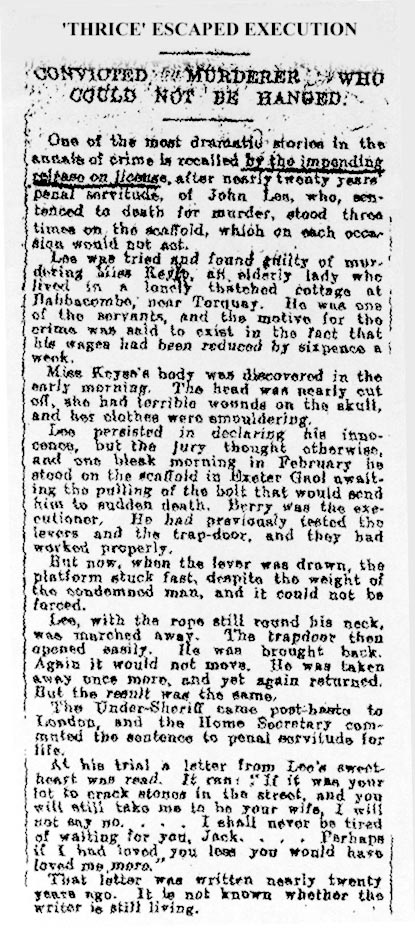
“One of the most dramatic stories is in the annals of crime is recalled by the impending release on licence after nearly twenty years penal servitude, of John Lee, who, sentenced to death for murder, stood three times on the scaffold, which on each occasion would not act. Lee was tried and found guilty of murdering Miss Keyse, an elderly lady who lived in a lonely thatched cottage at Babbacombe, near Torquay. He was one of the servants, and the motive for the crime was said to exist in the fact that his wages had been reduced by sixpence a week. Miss Keyse body was discovered in the early morning. The head was nearly cut off, she had terrible wounds on the skull and her clothes were smouldering. Lee persisted in declaring his innocence, but the jury thought otherwise, and on one bleak morning in February he stood on the scaffold in Exeter Gaol awaiting the pulling of the bolt that would send him to sudden death. Berry was the executioner. He had previously tested the levers and the trapdoor, and they had worked properly. By now, when the lever was drawn, the platform stuck fast, despite the weight of the condemned man, and he could not be forced. Lee, with the rope still around his neck, was marched away. The trapdoor then opened easily. He was brought back. Again it would not move. He was taken away once more, and yet again returned. But the result was the same. The Under-Sheriff came post haste to London, and the Home Secretary commuted the sentenced to penal servitude for life. At his trial, a letter from Lee’s sweetheart was read. It ran: “If it was your lot to crack stones in the street, and you will still take me to be your wife, I will not say no…..I shall never be tired of waiting for you, Jack… Perhaps if I had loved you less you would have loved me more.” The letter was written nearly twenty years ago. It is not known whether the writer is still living.”
This news article caused a minor panic at the Home Office – but, for now, at least, the Home Secretary publicly stood his ground although off the record he did state: “NEVER” is a long time.
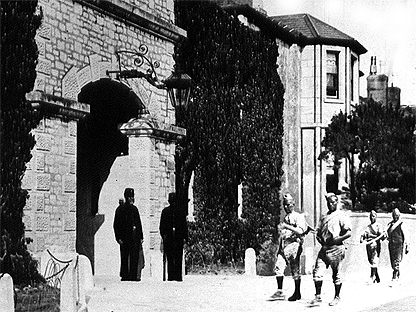
Thursday September 29 1904
The statement that John Lee, the “Babbacombe murderer” is about to be released on licence is going around the newspapers today. It states I suppose from misfact that Lee will have served 20 years next January and that most complex and a life sentence are released after 20 years.
But the rule is not an invincible one – Charlotte Winsor served 30 years and died in prison and there have been other exceptions.
John Lee’s sentence was commuted, not on the merits, but merely because of the accident which prevented the execution being carried out. In such a case the ordinary rule certainly does not apply.
Sir William Harcourt, when he commuted his sentence left on record his opinion that Lee ought never to be released, and Mr Ritchie (joint home secretary 1895 – 1902) expressed the same opinion.
It ought perhaps be well to decide now that John Lee will not be released on January next.
CPT 29/9/04
Secretary of State
I agree. There ought to be no question of releasing Lee in January, but “NEVER” is a long time.
MJ?
There is no (ground?) to justify release.
AAD (A. Ackers-Douglas – Home Secretary).
Memo:
In reference to newspaper paragraphs alleging that Lee is about to be released on licence: and decision of Secretary of State.
Minutes.
To Directors to note.
(The medical report has two Lee’s condition should be selected when he is completed 20 hours and afterwards annually) is.
In reply to …/19 save reports referred to our incorrect. Secretary of State regrets that he cannot advise interference when the convict has served 20 years.
C?T 4/10/04
M?? 5/10/04
Index:
Noted and governor instructed accordingly.
AAD
7/10/04
wrote Mr Armstrong
13/10/04
December 6 1904
Petition.
Asks for his case to be considered and to be allowed to grow hair.
GLJ
Sir,
Your petitioner humbly makes that you will take his case into consideration. And see has been imprisoned 20 years he was apprehended the 15/11/84, though he was not try until 3/2/85. He has done 20 years with good character. He also humbly begs that you will be pleased to granting permission to grow his hair sometime before it pleases you to grant in his discharge from prison. Because he will have to earn his living amongst his fellow men. And he does not want to be pointed out as having been imprisoned.
And you petitioner,
will ever pray,
L1 5 0 John Lee.
Memoranda
Minutes.
It would have been better I think to have informed him at once of the decision on …/20.
? Say that Secretary of State regrets he cannot grant in a licence on the completion of 20 years of the sentence.
C?T
6/12/04
? 6/12/04
wrote Governor
10 Dec 1904
